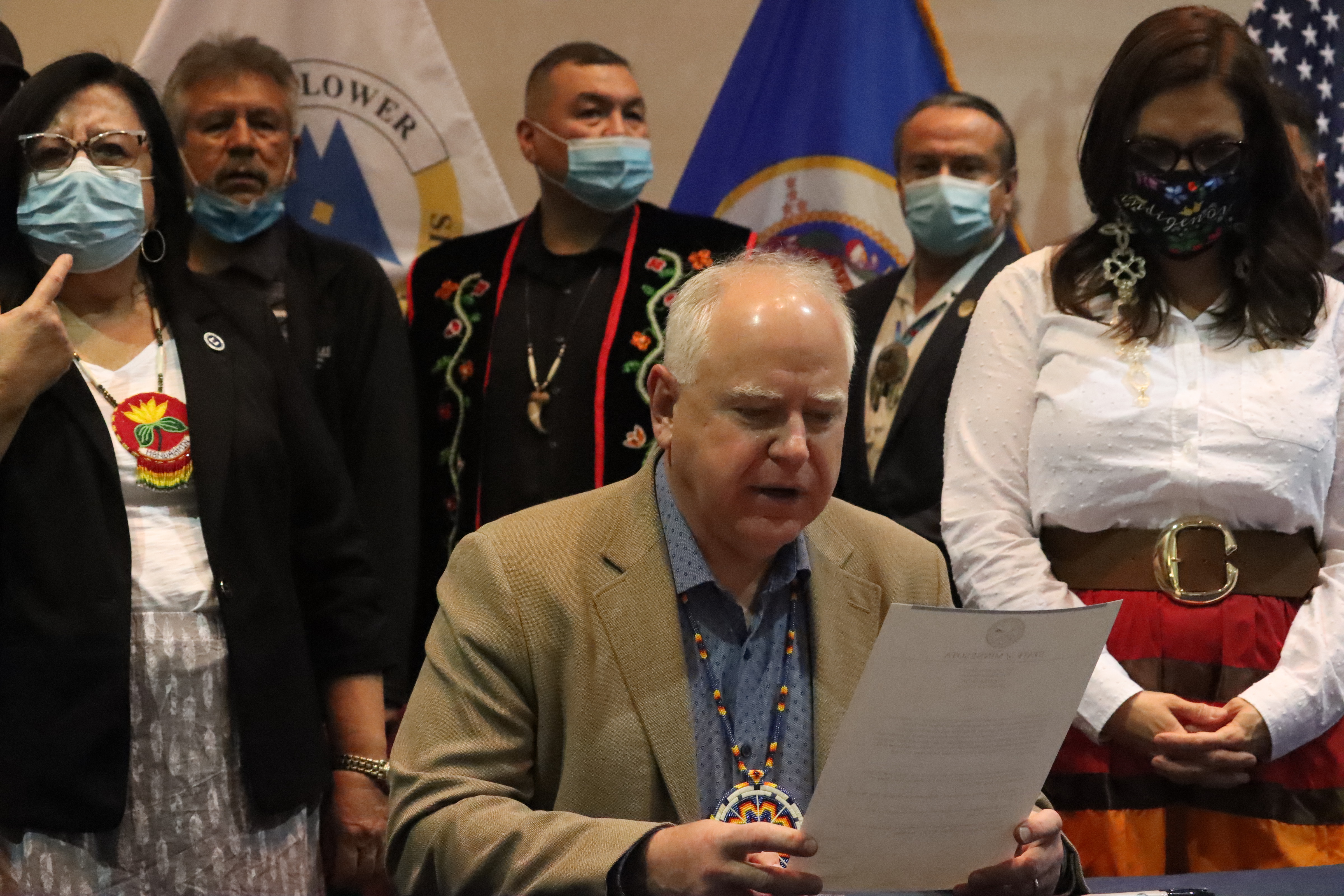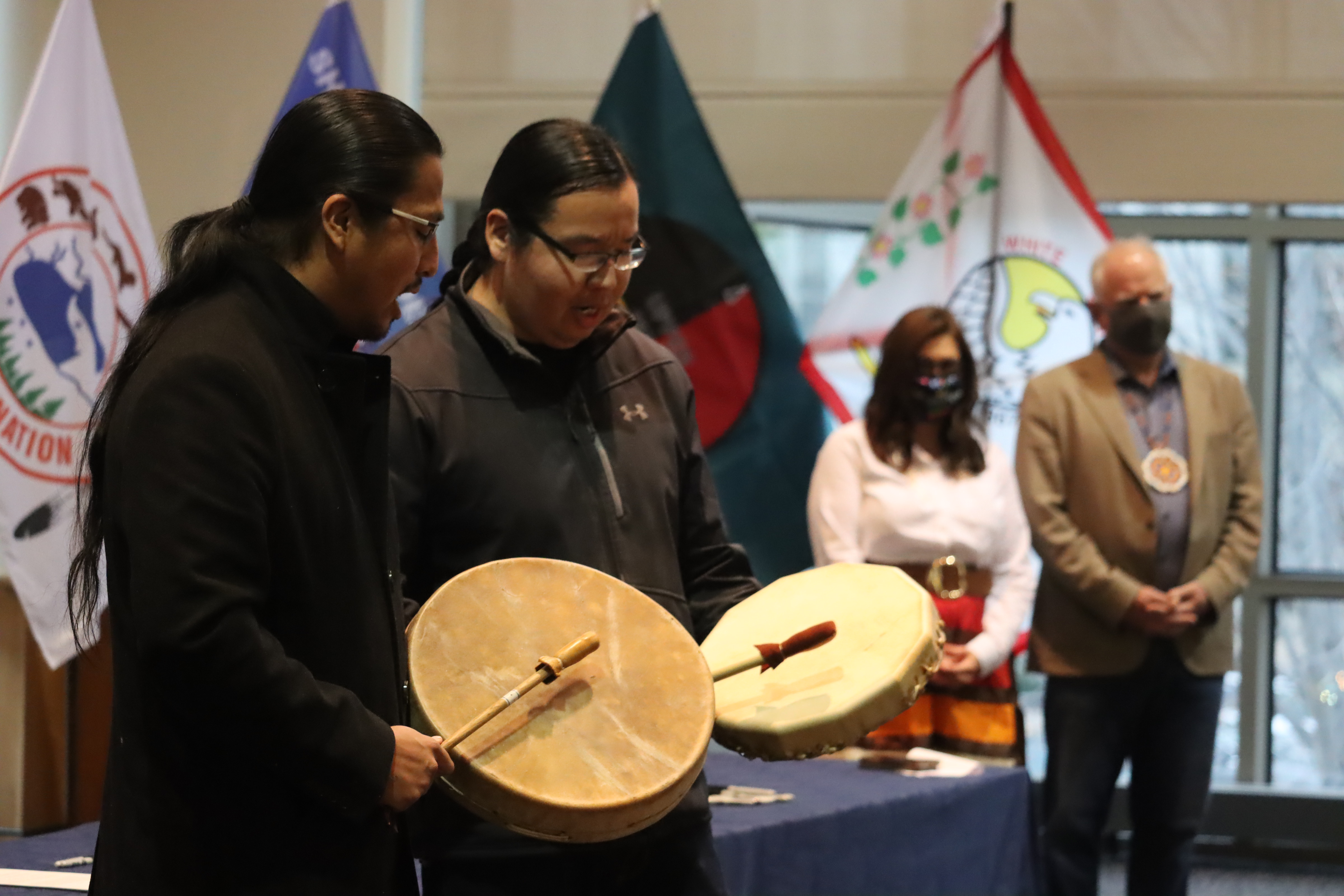
- Details
- By Darren Thompson
Saint Paul, Minnesota—Yesterday, Minnesota Governor Tim Walz and Lieutenant Governor Peggy Flanagan hosted a bill signing ceremony with elected Minnesota Tribal leaders from most of the 11 federally recognized tribes in the state. The ceremony was held on the Minnesota State Capitol Grounds at the State Department of Revenue. The bill, “Government to Government Relationship with Tribal Governments,” passed both houses of the Minnesota state legislature earlier this year on June 30, and was signed into law the next day by Minn. Governor Tim Walz. The bill signing ceremony was postponed until November due to COVID-19.
The bill codifies government to government relations and consultation of Executive Order 19-24 into Minnesota state law. It provides for Tribal-state relations and requires state agencies to implement Tribal consultation policies in consultation with Minnesota Tribal governments. It requires state agencies to develop and maintain ongoing consultation with Minnesota Tribal governments related to matters that have tribal implications, and for state agencies to designate a Tribal liaison to ensure nation-to-nation consultation is maintained and to serve as a point of contact for the tribes.
Want more Native News? Get the free daily newsletter today.
“This bill codifies the spirit of that Executive Order into law, so that it lasts beyond this Administration,” Brooke Wallington, a spokesperson from Governor Tim Walz’s office, told Native News Online.
“The status quo will continue if we don’t change it, but we made a commitment today, where the Governor and I signed a commitment that says we are rejecting the status quo,” said Minnesota Lieutenant Governor Peggy Flanagan during the bill signing ceremony. “The status quo wasn’t working for Native people, hasn’t worked for Native people, and it wasn’t working for Tribal governments.”
The bill signing ceremony opened with a song and prayer by Wakinyan and Thorne LaPointe, followed by speeches from Minnesota Governor Tim Walz and Lieutenant Governor Peggy Flanagan, who is an enrolled member of the White Earth Band of Ojibwe.
 Wakinyan and Thorne LaPointe being the bill signing ceremony at the Minnesota Department of Revenue Building with Tribal leaders on Monday, November 8, 2021. (Photo/Darren Thompson)
Wakinyan and Thorne LaPointe being the bill signing ceremony at the Minnesota Department of Revenue Building with Tribal leaders on Monday, November 8, 2021. (Photo/Darren Thompson)
“I’m grateful and uplifted after a day of nation to nation and true sovereign nation consultation,” said Minnesota Governor Tim Walz during the ceremony. “Thank you to our Native legislators for codifying what we know is critically important. The idea that our state and our sovereign tribal nations and our relationships should be in law, there should be an expectation to how those consultations are done.”
“We have to take intentional action to build a system that actually works for all of us,” said Flanagan.
“This is a strong starting point to ensure our Tribal Nations are an intentional part of the conversations and decision making that take place in our state,” said Minnesota Representative Heather Keeler to Native News Online. “When we work collectively, truly engage and listen to each other we will create a Minnesota that is worth handing to our next generations.” Keeler is an enrolled member of the Yankton Sioux Tribe and a Democratic–Farmer–Labor member of the Minnesota House of Representatives from District 4A, Moorhead, Minnesota.
“We have a letter of the law now, that forever forward, consultations and meetings between tribes and the state will happen,” said Walz. “There is a spirit that each of you embody being partners to make Minnesota a better place for each and every person.”
This story has been updated to clarify the codification of the Executive Order.
More Stories Like This
Native News Weekly (August 25, 2024): D.C. BriefsUS Presidents in Their Own Words Concerning American Indians
Senate Committee on Indian Affairs Passes 12 Bills to Strengthen Tribal Communities
Deb Haaland Tours CNM Workforce Facilities, Highlights Trade Job Opportunities
Federal Court Dismisses Challenge to NY Indigenous Mascot Ban
Help us defend tribal sovereignty.
At Native News Online, our mission is rooted in telling the stories that strengthen sovereignty and uplift Indigenous voices — not just at year’s end, but every single day.
Because of your generosity last year, we were able to keep our reporters on the ground in tribal communities, at national gatherings and in the halls of Congress — covering the issues that matter most to Indian Country: sovereignty, culture, education, health and economic opportunity.
That support sustained us through a tough year in 2025. Now, as we look to the year ahead, we need your help right now to ensure warrior journalism remains strong — reporting that defends tribal sovereignty, amplifies Native truth, and holds power accountable.
 The stakes couldn't be higher. Your support keeps Native voices heard, Native stories told and Native sovereignty defended.
The stakes couldn't be higher. Your support keeps Native voices heard, Native stories told and Native sovereignty defended.
Stand with Warrior Journalism today.
Levi Rickert (Potawatomi), Editor & Publisher
